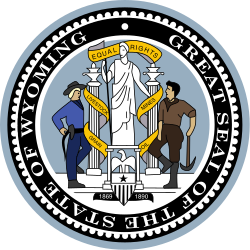| |||||||||||||||||
| |||||||||||||||||
 County results Simpson: 50–60% 60–70% 70–80% Hickey: 50–60% 60–70% | |||||||||||||||||
| |||||||||||||||||
| Elections in Wyoming |
|---|
 |
The 1962 United States Senate special election in Wyoming was held on November 6, 1962. This election was prompted by the death of Senator-elect Keith Thomson, who had been elected to the Senate in 1960. After his death Democratic Governor John J. Hickey appointed himself to fill the vacancy. A special election was then held to complete the remaining four years of the term in 1962. Hickey faced a strong challenge from former Republican Governor Milward Simpson in a rematch of the 1958 gubernatorial election. Despite a nationwide political environment that was largely favorable to Democrats, Democratic candidates faced strong opposition in Wyoming. Ultimately, Senator Hickey overwhelmingly lost his bid for re-election to Simpson, while Democratic Governor Jack R. Gage also lost re-election by a wide margin. Hickey was the last Democratic Senator from Wyoming until Gale McGee began his tenure, although McGee was the last remaining Democrat to serve in that role.

